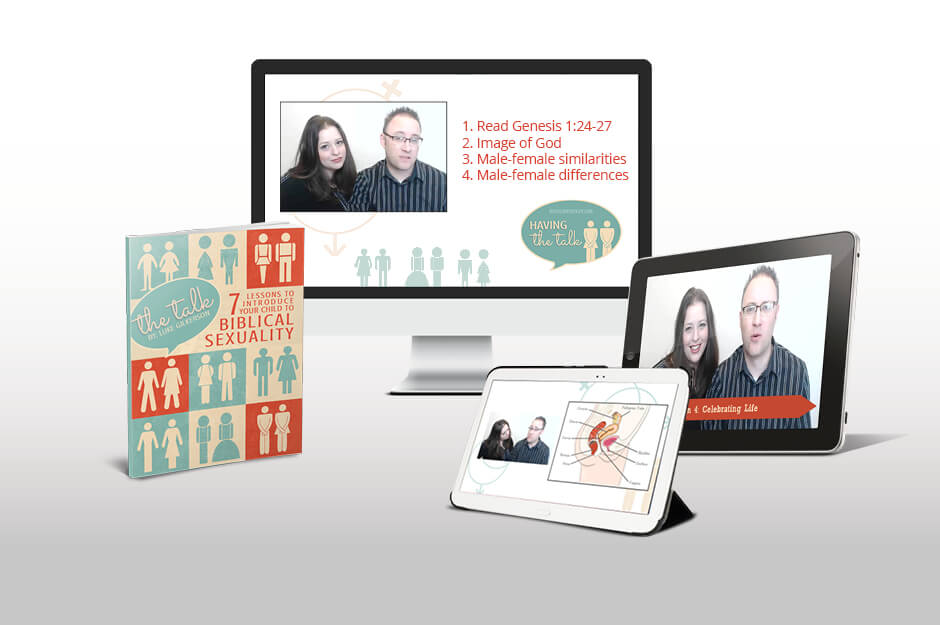“Mommy, how are babies made?”
This is a question that has caused anxiety for even the most stoic parents. Parents who wouldn’t flinch at the most probing life questions often freeze up when any questions surrounding the three-lettered s-word comes up.

You’re Not Alone.
Let me assure you, you’re not alone in your fear of having “the talk.” Many parents (in my experience) are terrified of this topic—or at least a bit uncomfortable at the thought of this question out of their sweet babe’s mouth.
I was recently chatting with a mom who is a sex-educator in the public schools. She’s literally talked to thousands of kids about sex over her career. But when it comes to her own kids? Nothing but fear and trepidation.
It might sound ridiculous that someone who has talked about sex so much would have such a great fear of talking to her own kids. But she just wasn’t sure how to break the ice. She avoided talking about sex at all costs. She pushed the topic under the rug so far it wasn’t even in the same house anymore!
When your babe asks, “Mommy, how are babies made?”
For many parents, this question pops up sooner than they are ready for. I’m certain for my dear mother, it happened sooner than she was ready for. She had quite the persistent, inquisitive daughter.
I remember, at the ripe old age of 6, how I insisted that I wanted to know where babies came from. Prior to this, she had told me they came from the mommy’s belly. I was not going to be satisfied with this answer. I persisted and demanded, “I want to know really how babies are made. I know they grow in the mommy’s belly, but how do they get there!”
I think my mom realized I wasn’t going to give up. And thus I prevailed in my search for information. My mom took me aside later that evening and gave me all the nitty gritty details, and I might have been a wee bit grossed out by it all.
Since then, I’ve learned a lot about talking to my own kids about sex. My husband and I have also produced numerous resources for Christian parents on this topic, so here is a no-freak out strategy for chatting with your little kiddo about how babies are made:
Tip #1: Realize the discomfort is yours and not your child’s.
Embarrassed. Squeamish. Anxious. Freaked out. Yes, those might all describe feelings you have when you think about having the talk with your little one, but realize these are your feelings, not your child’s.
While I don’t have a magic ball that can predict how your child will react, I can generally guarantee they’ll survive the chat emotionally unscathed. Some kids might be a little grossed out (daddy puts his what, where?), others might be fascinated, and still others might be a bit indifferent. They’ll all survive conversations about sex and live to tell about it.
Tip #2: Chat later, but don’t sweep it under the rug.
When you’re in total freak out mode, it is not the best time to have the conversation. My suggestion: compose yourself and tell your child you’ll answer their question later that day (or the next). Don’t sweep it under the rug, but do give yourself time to prepare. You don’t want to be stuttering and stumbling through the entire conversation.
Don’t put your child off too long. They need to know that they can ask questions and that you’ll answer honestly.
Tip #3: Be honest, concrete, and literal.
This is where some parents really get tripped up. In an effort to avoid embarrassment, they use weird language that doesn’t always make sense. They might say something like, “Mommy gives Daddy a special kind of hug and that’s how babies are made.” Or they might use strange terms for male and female genitalia or just give part of the information. This can be confusing or misleading to a child.
Just be concrete, honest, and literal with your explanation. For instance, you could say…
“Inside Mommy’s body are something called eggs. These are very tiny cells—so small you can’t see them with your eyes—and they are part of what makes a baby. Inside Daddy are something called sperm which are swimming cells that are even smaller than eggs. The way a baby is made is Daddy puts his penis in Mommy’s vagina. Daddy releases the sperm from his penis. These sperm swim to the egg and one of them might fertilize an egg that is near the mommy’s uterus. When this happens, a baby is made!“
(Yes, I just talked about penises and vaginas and how they go together, and no, saying this to your kid will not scar your child for life or turn them into perverts.)
Of course, you will need to continue that explanation and give even more details about what happens to the egg after it’s been fertilized. This statement above also assumes they know what penises, vaginas, and uteruses are, but if you haven’t really covered that yet, you can be straightforward about that, too. Using some simple drawings for diagrams of internal and external anatomy is also helpful.
Tip #4: Let the Bible break the ice for you.
You might be scratching your head wondering how to start these conversations without making it awkward. My #1 tip is to let the Bible break the ice for you.
The Bible helps you to stress context. Talking about the anatomy of sex is pretty easy, actually. But we need to state what our sexual values are: stressing the goodness and power of sex and how it is meant for married couples alone.
I know the Bible isn’t a biology textbook. But it has many truths about human sexuality that can help you start the conversation. The benefit of using the Bible is, for Christian parents who are already in the habit of sitting down and chatting with their kids about the Scriptures on a regular basis, these conversations about sex will just seem like a natural extension of that habit.
Use lessons in Genesis 1-2, like, “God created them male and female,” or “Be fruitful and multiply.” These are great lessons to introduce the topic of the difference between men and women and who being fruitful and multiplying is and how it happens.
Tip #5: Keep the conversation going!
Parents often talk about “the talk” as if it’ a one-and-done type conversation. While many parents unfortunately treat the topic like this, I urge you…don’t. The Journal of Adolescence reports that parents who have ongoing conversations with their children about sex as they’re growing up are much more likely to remain abstinent than their naive peers.
Your children need you to continue talking to them about this topic. In this overly-sex-saturated world we live in, they will learn about sex. If it isn’t from you, it will be from the world.
Answer your children’s questions. Be honest and open. Bring up topics in the news and media. Help your children understand that sex is powerful and often abused, but sex is also a good gift from a good God.
Sex Education Training
Obviously, these kinds of conversations are not a typical first-time birds-and-the-bees talk. There are many conversations that need to come first.
This is why my wife and I have released a brand new e-course called Having the Talk: Biblical Sex Ed Training for Parents. In this course we talk about…
- How to know when to begin talking to your kids about sex
- Talking to kids about the differences in male and female anatomy
- How to communicate the function and purpose of sex with your kids
- How babies develop in the womb
- The importance of sex within a marital relationship
- How to talk to your kids about adultery and sexual sin
- How to talk to kids about sexual abuse
- Many frequently asked questions both kids and parents have













My husband and I have three children: 18, 12, and 5…and we’ve always answered the kids’ questions directly, but with an age appropriate answer.
When each of our kids has asked us how babies are made (usually they were around 4 the first time they asked), we would tell them that we made them with our bodies. That usually satisfied them for the time being.
When they got a little older, they would ask more detailed questions and we’d answer those, only giving them enough information to answer the question until they pursued the subject further. We let them lead, in the questions they asked, and that worked well for us because they got the amount of information they needed for the time.
We’ve found that having a series of conversations throughout the span of their childhood (and beyond, now, with our oldest daughter) works better for us than one “big talk”. We’ve never been squeamish about answering any of the questions, which is good because it helps the kids feel that we are approachable on this as well as other sensitive subjects.
I think you’re right about having a series of talks throughout kids lives is the best way to go. The research all points that way as well. Numerous studies have shown that when parents are talking to their kids and having lots of good conversations throughout their childhood and teen years they’re much more likely to remain abstinent.
I will never forget the day when I was at my sister’s house (waiting for her to get home from work) when my niece was about 5 years old and my sister’s husband just came into the room and sat down on the sofa when my niece blurted out “What’s a penis?”. His face.. red and full of shock and horror as he looked at me and said “What do I say?” made me both laugh and also feel a bit bad for him. I told my niece what a penis was- a boy or man’s genital part and I asked her if she had any other questions and she seemed happy with the answer I gave and off she went looking for a toy. Seems kids will ask questions about anything, just spur of the moment, lol.
So far my son doesn’t seem interested in babies or where they come from but he knows the correct words for body parts and what they are for. I personally don’t understand why people make a big deal out of it. I answer the questions or bring up the topic if I think it is pertinent at the moment. We will continue to express to our son that sex is something that should hopefully be done after marriage and it is a good thing between married people, and God made it to be like that so the couple has trust in their relationship and it is something special to them two alone and also it prevents more so the bad feelings and heartaches for everyone involved if the relationship were to break up (stds, teenage pregnancy or fatherhood, heartbroken couple, heartbroken kids etc).
I have to admit that I squirmed a bit while reading #3….I am terrified of this conversation, but you have given excellent insight that I will definitely refer to when the time comes. Thanks for that!
Thanks for sharing at Let’s Get Real Link Party.
My husband and I just watched Video 1, and would love to watch the next two videos. How do I find those?
Hi Shannon,
I apologize for the delay in getting back to you here! If you haven’t figured it out, you should have received emails with links to the next videos. If you still are looking for info, please feel free to email me at trisha@intoxicatedonlife.com
When we were expecting our second baby, our first son wanted to know about babies, body parts ect…so we told him that some day when he was married he would get to have babies with his wife. He said WOW!!! Keep in mind he was three, lol!
Hi Trisha, I love what I see here, and I have 3 little ones that are getting curious. I do have one question. Did you tell your kids not to discuss this topic with their friends? My wish is for my kids to have a Biblical understanding of sex, but I know there are still parents out there who might not agree with me. But at the same time, should I make them feel like this information is like a secret?
We did tell our kids not to discuss this topic because it’s a good conversation for parents to have with their kids. We told our kids that a lot of children have questions about this stuff, and it’s best for them to be in the habit of asking their parents because we want them to get all their questions answered the right way.